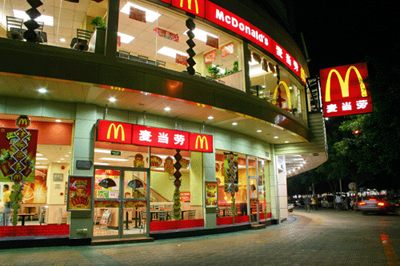 The decision to sell a controlling stake of McDonald´s to private investors in the Carlyle Group, Citic Capital and Citic Group triggered off mixed reactions among analysts. Retail analyst Ben Cavender says the new investors can help to refurbish and expand the chain. Peking University business professor Jeffrey Towson sees a different management style, that makes competitor KFC run for its money. But business analyst Shaun Rein sees to end to the inevitable decline of McDonald´s.
The decision to sell a controlling stake of McDonald´s to private investors in the Carlyle Group, Citic Capital and Citic Group triggered off mixed reactions among analysts. Retail analyst Ben Cavender says the new investors can help to refurbish and expand the chain. Peking University business professor Jeffrey Towson sees a different management style, that makes competitor KFC run for its money. But business analyst Shaun Rein sees to end to the inevitable decline of McDonald´s.

Retail analyst Ben Cavender sees mainly advantages, he tells Bloomberg:
“Citic and Carlyle’s resources will allow McDonald’s to expand rapidly and refurbish old restaurants, which is expensive to do,” said Ben Cavender, a Shanghai-based analyst at China Market Research Group. “Given that McDonald’s lags behind KFC in terms of store count in China, we can expect them to expand aggressively and invest heavily.”
Yum China Holdings and Starbucks Corp. plan to add about double the number of stores — as many as 3,000 in China — over the same period.
Under the deal, Chinese state-backed conglomerate Citic and Citic Capital Partners will jointly take a 52 percent stake, while Carlyle will hold 28 percent.
While Citic and Carlyle are paying a “substantial price,” for 20-year franchise rights, the food and beverage chains are “cash machines,” Cavender said. In contrast, Yum China licensed the KFC and Pizza Hut brands from Yum! Brands Inc. for 50 years, with automatic renewals that could make it possibly indefinite.

Peking University professor Jeffrey Towson tells on his LinkedIn page, the new investors are likely to develop a more aggressive mangement style, to get a decent return on investment:
The two factors I look at most for restaurants in China are menu popularity (against often rapidly changing consumer preferences) and management performance. Restaurants are businesses where you have to fight and re-win your market share every year. And management performance is critical in this.
The sale of McDonalds China means it will now have a very different management / ownership model than Yum!. It will have a more aggressive and I think more effective model.
Despite the recent spin-off, Yum! China has remained a public company with fairly diffuse ownership and traditional corporate management. The senior management has minimal equity ownership. The company has limited corporate debt. And the CEO and senior management probably have relatively short terms. Note: the average tenure for a public Fortune 500 company CEO is like 2-3 years.
In contrast, McDonalds China is now majority controlled by Citic Capital / Citic Group and Carlyle Group. We can assume they are probably implementing the PE management playbook:
- Management with a big upside based on options against already specified performance metrics.
- Increased corporate debt that basically places a sword at the neck of management.
- A very focused 3-5 year plan that will significantly change the financials.
I suspect their plan is going to include opening lots of new stores quickly (probably in 2nd and 3rd tier cities – and by sub-franchising) and converting the currently-owned stores to franchises (which will free up capital and pop the ROE). That’s a guess but I think it is likely. Note; If you want to see this plan in action, look at the performance of Burger King since it was purchased by 3G capital in 2010.
So KFC has always had an advantage in menu popularity in China. But McDonalds now might have a significant advantage in management. It is like Yum! China is driving a sedan and McDonalds has just upgraded to a Ferrari. This should worry them.

But business analyst Shaun Rein is less optimistic McDonald´s can reverse its downhill track, he tells to Reuters:
The U.S. fast food chain said local partners will help speed up growth in the world’s No. 2 economy through new restaurant openings, particularly in smaller cities that are expected to benefit from increased urbanization and income growth.
“McDonald’s globally overall is struggling and didn’t have the money or intellectual resources to focus on China,” said Shaun Rein, managing director at China Market Research Group.
The company has more than 2,400 restaurants in mainland China and roughly 240 in Hong Kong. The new partnership plans to add 1,500 in the two areas over the next five years…
The partnership will also aim to boost sales at existing restaurants, with menu innovation a key focus. Fast-food firms including McDonald’s and Yum Brands Inc (YUM.N) are recovering from a series of food-supply scandals in China that have undermined their performance.
“I’m not sure how much more you can do with McDonald’s in China. They’re a well-run company, so I’m not sure that CITIC and Carlyle are able to add that much more aside from capital,” Rein said.
Shaun Rein, Jeffrey Towson and Ben Cavender are speakers at the China Speakers Bureau. Do you need them at your meeting or conference? Do get in touch or fill in our speakers`request form.
Are you looking for more strategy experts at the China Speakers Bureau? Do check out this list.



